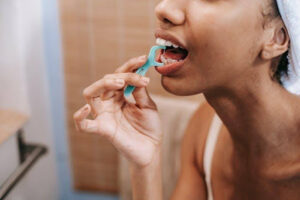Beyond aesthetics, cosmetic dentistry plays a crucial role in enhancing overall dental health. This blog aims to uncover the dynamic relationship between cosmetic procedures and dental well-being while providing practical insights and tips for those considering a brighter, healthier smile.
Solves Problems Like Misaligned or Crooked Teeth
Cosmetic dentistry is particularly effective in addressing misaligned or crooked teeth. Traditional braces and modern alternatives like Fairfax Invisalign work to reposition teeth into optimal alignment. This realignment enhances the visual appeal of a smile while simultaneously promoting better oral health by facilitating easier cleaning and reducing the risk of gum disease.
Misaligned teeth can lead to various dental issues, including difficulty in chewing, increased wear on tooth enamel, and jaw pain. By correcting these misalignments, cosmetic procedures help distribute bite pressure evenly across the teeth, minimizing potential damage. Properly aligned teeth also prevent food from getting trapped in hard-to-reach areas, significantly lowering the chance of decay.
The Role of Technology in Cosmetic Dentistry
Modern technology has revolutionized cosmetic dentistry, making procedures more effective, efficient, and comfortable for patients. Innovations such as digital imaging, CAD/CAM systems, and laser dentistry have significantly enhanced the precision and outcomes of cosmetic treatments.
Digital imaging allows dentists to create accurate models of a patient’s mouth, aiding in the design of custom solutions like veneers and aligners. This technology ensures a perfect fit and natural appearance, contributing to more successful results. Additionally, digital tools provide patients with a preview of their post-treatment smiles, helping them make informed decisions.
Enhancing Overall Oral Hygiene
Cosmetic dentistry not only improves the appearance of teeth but also plays a vital role in promoting overall oral hygiene. By addressing issues like misalignment and gaps, these procedures make it easier for individuals to maintain clean and healthy mouths.

For instance, straightening teeth with Invisalign reduces the spaces where plaque and bacteria can accumulate, making brushing and flossing more effective. Veneers, by providing a smooth surface, also aid in maintaining oral cleanliness and preventing decay. These enhancements contribute to a healthier smile, decreasing the risk of periodontal disease and other dental complications.
Improving Bite Functionality
Cosmetic dentistry extends its benefits to improve bite functionality, which is crucial for overall oral health and comfort. Procedures like orthodontics and dental implants address bite alignment issues, ensuring a balanced distribution of pressure across all teeth during chewing.
A proper bite reduces strain on individual teeth, preventing premature wear and potential fractures. It also alleviates stress on the jaw muscles, decreasing the risk of temporomandibular joint (TMJ) disorders. By improving bite functionality, cosmetic dentistry enhances not only dental health but also overall well-being.
Lasting Relationships with Your Dentist
Choosing to undergo cosmetic dentistry often leads to building strong, long-lasting relationships with dental professionals. Regular visits for maintenance and check-ups ensure that enhancements remain in excellent condition and that any emerging issues are promptly addressed.
These ongoing interactions provide an opportunity for patients to gain valuable insights into their oral health and learn preventive care techniques. Dentists, in turn, can monitor changes in dental conditions and make timely recommendations for additional treatments or adjustments.
Cosmetic dentistry is a powerful tool that bridges the gap between beauty and dental health. By addressing aesthetic concerns and functional issues, it enhances not only smiles but also overall well-being. For individuals seeking improved appearance and dental health, cosmetic dentistry offers a comprehensive solution that transforms lives.



